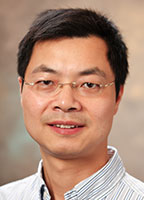Deficiencies in eye development as well as degenerative diseases result in compromised vision and blindness.
Investigators at the Black Family Stem Cell Institute are studying eye development and patterning, stem cell modeling of human eye development and diseases, cell replacement therapy, and endogenous regenerative strategies for restoring vision.
Major research focuses include: examining the role of Wnt-Fz/PCP, Notch, and EGFR-signaling in eye development and patterning; understanding human retinal development in normal and diseased conditions; in vitro modeling eye diseases (age-related macular degeneration, proliferative vitreoretinopathy, and proliferative diabetic retinopathy) using pluripotent stem cells and retinal pigment epithelial cells; retinal stem cell biology and cell replacement therapy; and retinal regeneration via reprogramming resident stem cells.
Investigators with a major focus in eye research include:


